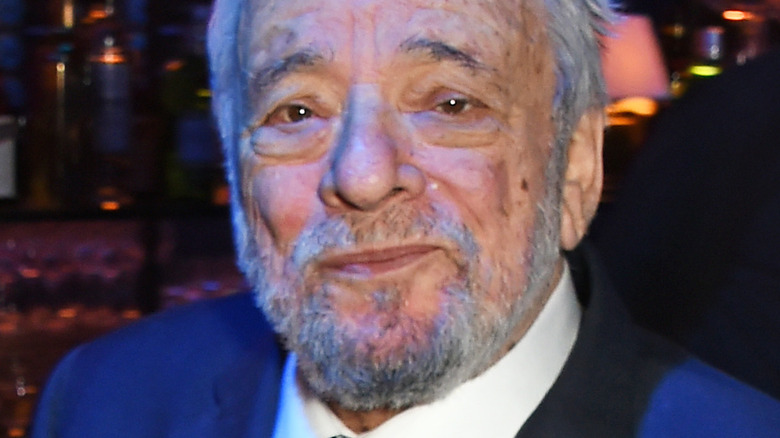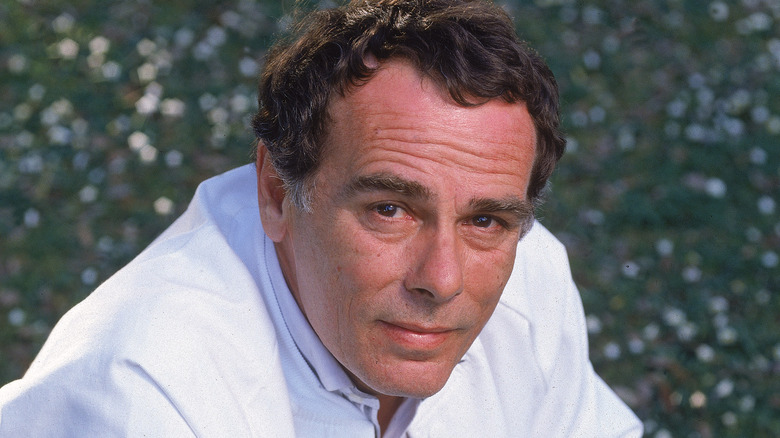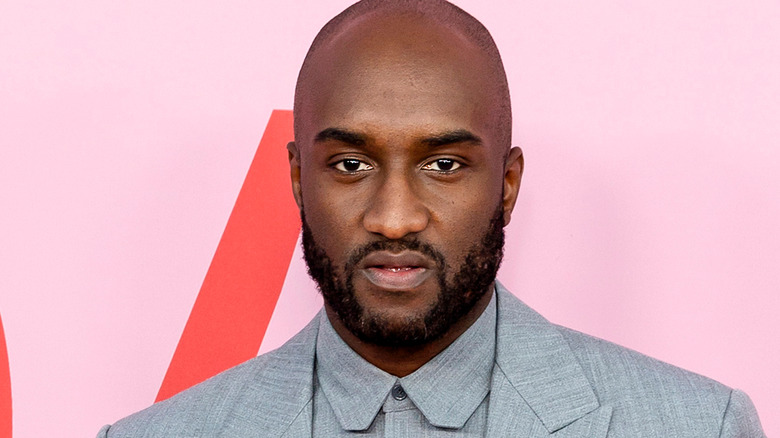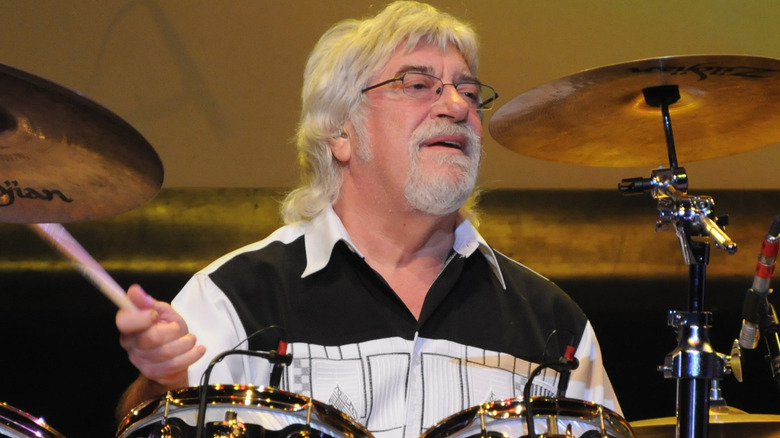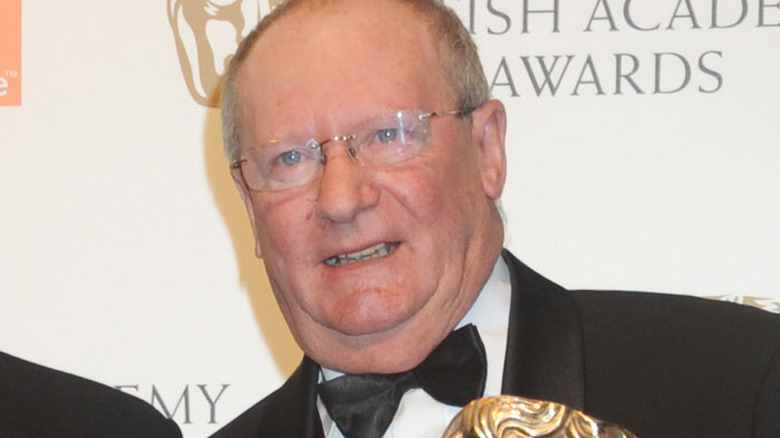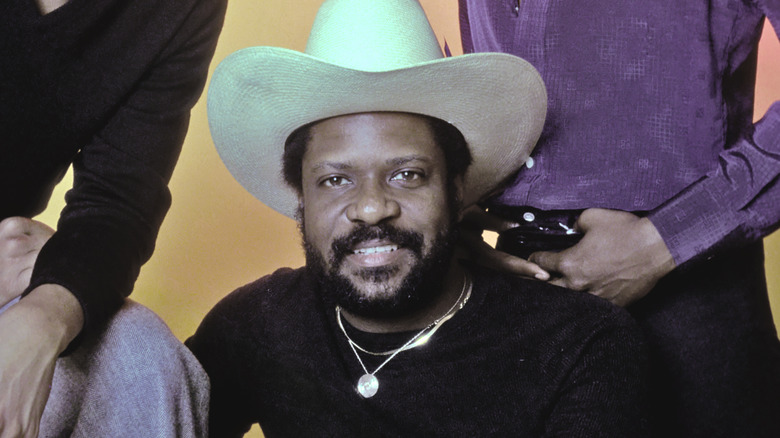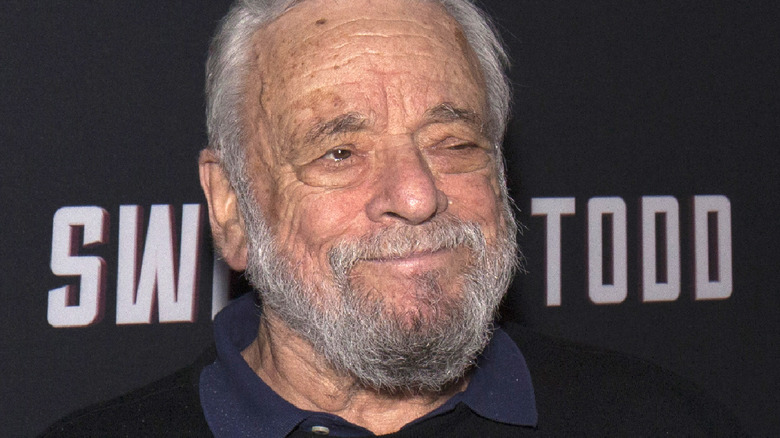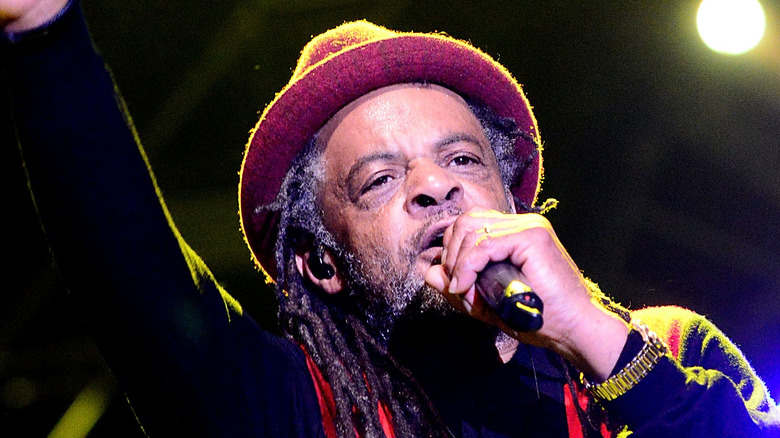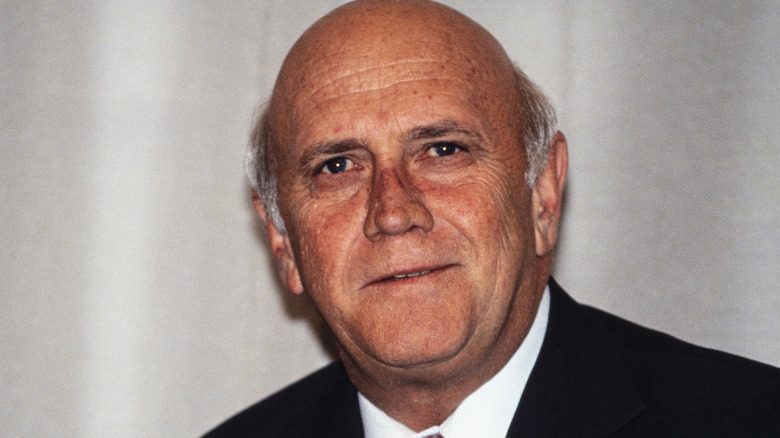Every Major Death In November 2021 Explained
November is a time when millions of people start to buckle down until the end of the calendar year, spending more time inside and with loved ones, retreating from public life a little both because of declining temperatures and because the holiday season is approaching. Events like Thanksgiving, Christmas, and Hanukkah are special, and are commonly and traditionally celebrated amongst family, friends, and other loved ones.
Those holidays generate memorable moments, the ones that last long after the people who were around to celebrate have passed away, a natural part of life that still occurs even during these otherwise joyful months. Life goes on, and life ends, people live, and people die, and a number of famous, important, influential, and widely loved individuals all died in November this year. Here are all the notable names from around the world — musicians, entertainers, artists, politicians, and creators — who captured headlines and inspired many remembrances and tributes — upon their deaths in November 2021.
Dean Stockwell
Dean Stockwell was most and most fondly known for his role as Admiral Al Calavicci, the gravelly-voiced, fun-loving hologram who helped out time-traveling body-inhibitor Sam Beckett on the 1989-1993 NBC sci-fi cult hit "Quantum Leap," a role which netted the actor four Emmy nominations and a Golden Globe win. But playing Al was a career-capper, as Stockwell had been a regularly working actor since 1945, when, as a 9-year-old, he landed a supporting role in the Gene Kelly musical "Anchors Aweigh." Stockwell racked up more than 200 credits, including an Oscar-nominated turn as gangster Tony "The Tiger" Russo in "Married to the Mob," a role in Wim Wenders' classic indie drama "Paris, Texas," and David Lynch's unsettling masterpiece "Blue Velvet."
Stockwell had a hippie period in the mid-1960s, hanging around the musicians and artists who occupied California's Topanga Canyon. At the behest of friend Dennis Hopper, according to USA Today, Stockwell wrote a script for a never produced film that inspired "After the Gold Rush," a seminal album by Neil Young, with whom the actor would collaborate on the 1982 movie "Human Highway" and provide cover design for the 1977 LP "American Stars 'N Bars."
On November 9, 2021, Stockwell's representative told USA Today that the actor had died in New Zealand, with family present. He was 85.
Virgil Abloh
Born in Illinois to first-generation Ghanaian immigrants, Virgil Abloh trained as a civil engineer and architect before he got on dual fast tracks to the worlds of high fashion and hip-hop. In the early 2000s, Abloh met Kanye West when they were both interns at the fashion house Fendi, according to NSS Magazine. After West became an influential and pioneering hip hop figure who incorporated visuals, fashion, and design into his work, he appointed Abloh his artistic director and head of Donda, West's creative agency, solidifying an ambitious and fruitful agenda. Abloh rose through the ranks of fashion to become artistic director of menswear for the storied Louis Vuitton while also simultaneously managing his own line of streetwear, Off-White, of which Louis Vuitton bought a controlling interest and allowed Abloh to incorporate some of the choices and styles he made in that avenue. Abloh didn't just design clothes — he also dabbled in furniture design and worked as a DJ, according to Vulture.
Virgil Abloh died on Sunday, November 28, 2021, at age 41. The news broke on his Instagram. "For over two years, Virgil valiantly battled a rare, aggressive form of cancer, cardiac angiosarcoma," the post read. "He chose to endure his battle privately since his diagnosis in 2019, undergoing numerous challenging treatments."
Graeme Edge
The Moody Blues brought a new, dreamy, and ethereal dimension to rock music in the 1960s and 1970s. As part of the sub-genre that would be called progressive rock, the British group played artsy, thoughtful, haunting tunes like "Gemini Dream" and "Nights in White Satin" with instrumentation not generally found on rock records (like flutes and string sections). The Rock and Roll Hall of Fame inductees sold 70 million records (per Musicradar) across its more than five decades as a going concern, with founding member Graeme Edge playing drums and percussion (and occasionally singing) for the band's entire history. One of the most distinctive features of Moody Blues albums were its long, mood-setting preludes — based on poems written by Edge, according to Variety.
When Edge decided to retire from music in 2018, the Moody Blues ended with him, according to band frontman Justin Hayward (per the group's website). It was Hayward who broke the news of his longtime bandmate's death. "Graeme was one of the great characters of the music business and there will never be his like again," Hayward wrote. Edge was 80 years old.
Bob Baker
As a screenwriter and scripted for series television, Bob Baker helped shape two of the biggest and most beloved pop culture franchises to come out of the United Kingdom in the second half of the 20th century. Born in the Bristol region of England, according to The Guardian, he teamed up with creative partner Dave Martin to form a prolific duo known as "The Bristol Boys" backstage at the production facilities of the long-running sci-fi series "Doctor Who" in the 1970s. Between 1971 and 1979, Baker wrote or co-wrote 32 episodes of the popular show. During his time on the show, he and Martin created what was supposed to be a one-time character turned popular recurring player through many later generations of "Doctor Who": K9, a dog-like robot with artificial intelligence and an encyclopedic knowledge. In the 1990s, Baker landed another collaboration, working with clay animator Nick Park on "The Wrong Trousers," the second wacky and humorous short starring Wallace and Gromit, a bumbling inventor and his hyper-intelligent dog, respectively. Baker went on to co-author two more Wallace and Gromit shorts as well as the duo's feature film, "The Curse of the Were-Rabbit."
Bob Baker's death was announced on November 7, 2021. The screenwriter was 82.
Ronnie Wilson
The Gap Band mixed '70s-style funk with a hook-laden pop sensibility. Among the absolute classic party essentials the Gap Band gave the world in the '80s: "Oops Up Side Your Head," "You Dropped a Bomb on Me," and "Early in the Morning." According to AllMusic, the Tulsa, Oklahoma-raised brothers Robert, Charlie, and Ronnie Wilson were brought up in a musical family and played in the band at their father's church. Oldest son Ronnie had started his own band by age 14, and it wouldn't be long until he formed a family act called the Greenwood, Archer, and Pine Street Band, later abbreviated to the G.A.P. Street Band, and finally, the Gap Band. After signing with Mercury Records, the Gap Band dominated the Billboard R&B charts from the late 1970s to the early 1990s, racking up 15 top 10 singles. According to NPR, their music resonated and continues to do so with other musicians — rappers including Ice Cube, Snoop Dogg, and Tyler, the Creator, have all sampled Gap Band tunes.
On November 3, Ronnie Wilson's wife, Linda Boulware-Wilson wrote on Facebook that her husband died the previous day. "Ronnie Wilson was a genius," she said. "He will be truly missed!!!" Ronnie Wilson was 73.
Stephen Sondheim
Musical theater — stage productions of plays where characters burst into song to express feelings mere spoken words cannot properly convey — existed before Stephen Sondheim, but he reshaped, elevated, and advanced Broadway musicals into a heady, complex, artistically mature and provocative medium. He had a hand in numerous musicals both classic and enduringly popular, writing the lyrics for "West Side Story," "Gypsy," and music and lyrics for "A Funny Thing Happened on the Way to the Forum," "Company," "Sweeney Todd," "Sunday in the Park with George," and "Into the Woods," among others. He personally won eight Tony Awards and even a Pulitzer Prize for Drama, and the New York Times called him "theater's most revered and influential composer-lyricist of the last half of the 20th century, if not its most popular." His themes could be dark ("Assassins" is about the people who murdered American presidents), and his music could be complex and tricky to sing, especially when coupled with Sondheim's pensive, clever, wordy lyrics.
According to Sondheim's lawyer, F. Richard Pappas, Sondheim was not sick at the time of his death, on November 26, 2021. A day after celebrating Thanksgiving with friends, the composer died at his home in Roxbury, Connecticut, at the age of 91.
Max Cleland
According to the Washington Post, Georgia-raised Max Cleland signed up to fight with the U.S. Army in the Vietnam War, echoing his father's move to join the Navy in World War II, following the attack on Pearl Harbor. On April 4, 1968, a battalion under the command of Cleland, a captain and communications officer, fell under siege, and he put himself in harm's way to move the wounded to safety. Four days later, he was seriously injured in an accidental grenade explosion. Cleland lost three appendages (two legs and one arm), spent eight months recovering at the Walter Reed Medical Center, learned to walk with the aid of prosthetics and crutches, and later earned a Bronze Star and Silver Star for his combat heroics, per NPR.
Just two years after suffering injuries that nearly killed him, Cleland entered politics, winning a seat in the Georgia state senate, and was later appointed by President Jimmy Carter to lead the Veterans Administration. After 14 years as Georgia's Secretary of State, Cleland served as a U.S. Senator from 1997 to 2003. Despondent after losing re-election, Cleland counseled veterans at Walter Reed and in 2009, was appointed secretary of the American Battle Monuments Commission by President Barack Obama.
According to the New York Times, Cleland died on November 9, 2021, of congestive heart failure. He was 79.
Astro
According to The Hollywood Reporter, the British pop reggae band UB40 was named after a unemployment benefits form in the U.K., which several of its members had to fill out while trying to make ends meet during a late 1970s and early 1980s economic downturn under the strict, anti-labor, welfare-cutting policies of prime minister Margaret Thatcher. The band's early hits, "One in Ten" and "Madame Medusa," served as anti-Thatcher protest songs, but UB40 became an international sensation thanks to its cover of Neil Diamond's "Red Red Wine," according to Financial Times. The song would top the Billboard Hot 100 in the U.S. in 1984, giving many Americans their first taste of reggae, the music style of Jamaican origin that sometimes featured rapidly and rhythmically delivered spoken vocals, a porto-form of rap called "toasting." UB40's resident toaster: Terence Wilson, a.k.a. Astro, according to NPR, who performed on "Red Red Wine," along with many other of the band's smash hit singles and albums.
A schism in the band led to two separate versions of UB40 in the 2000s, and Astro became a part of UB40 Featuring Ali Campbell, Astro, and Mickey Virtue, according to Swan Turton. That version of the group announced on its Twitter page on November 6, 2021 that Astro had died following "a very short illness." The toaster was 64.
F.W. de Klerk
For decades, the National Party, South Africa's political organization for and led by Afrikaners, predominantly white descendants of Dutch settlers, dictated most every aspect of life for the people of the nation. Under white minority rule, South Africa operated under strict, state-sanctioned segregation and separation, or apartheid, in which the country's Black residents, a majority of the population, weren't afforded basic rights, including the right to vote. In 1989, lawyer and politician F.W. de Klerk was elected head of the National Party, and later that year, president of South Africa, controversially calling for an end to apartheid, according to NPR. In early 1990, presiding over a South Africa that had been heavily sanctioned and isolated from the world due its separatist policies, de Klerk announced that anti-apartheid champion Nelson Mandela would be freed after 27 years as a political prisoner. The president also legalized anti-apartheid organizations, including the African National Congress political party, which ran Mandela as its presidential candidate in 1994. After de Klerk's administration abolished apartheid, Black South African were able to vote, and Mandela won the election. For introducing democracy to South Africa, de Klerk and Mandela shared a Nobel Peace Prize.
According to a spokesman from the F.W. de Klerk Foundation, the statesman had received a cancer diagnosis, and he died at his home in Fresnaye, part of Cape Town, South Africa, on November 11, 2021. He was 85.
Ado Campeol
"Ado Campeol" isn't a household name, but he had an indelible, important, and delicious influence on modern Italian cuisine. While many dishes commonly found on the menus of Italian or Italian-inspired restaurants feel rustic and timeless, there's one dessert that's relatively new: tiramisu, an elegant, layered, cake-based dessert consisting of coffee-soaked cookies, mascarpone, and chocolate powder. According to the BBC, it dates back to 1972, when it was developed and first served at Le Beccherie, a restaurant in Treviso, Italy. The eatery had been in Campeol's family since the 1930s, and Ado took control in the mid-1940s. One day in the early 1970s, the restaurant's chef, Roberto Linguanotto, was making vanilla ice cream when he got the idea to mix mascarpone in with some eggs and sugar. He liked the taste, and with Campeol's wife and co-manager, Alba, they worked on the dessert, adding the creamy blend to coffee-saturated ladyfinger cookies and topping it with chocolate. Because of the caffeine and sugar hit, they called it "pick me up," or, in Italian, "tiramisu."
The dessert became a signature menu item at Le Beccherie, and was imitated by restaurants around the world. Ado Campeol died in November 2021 at the age of 93.
